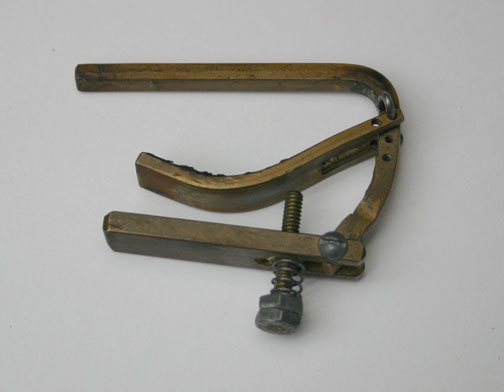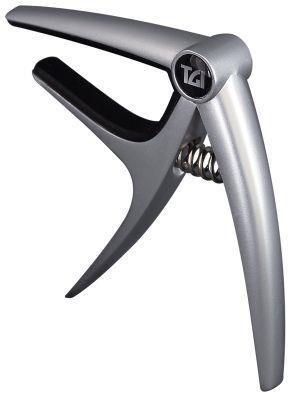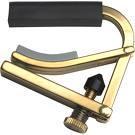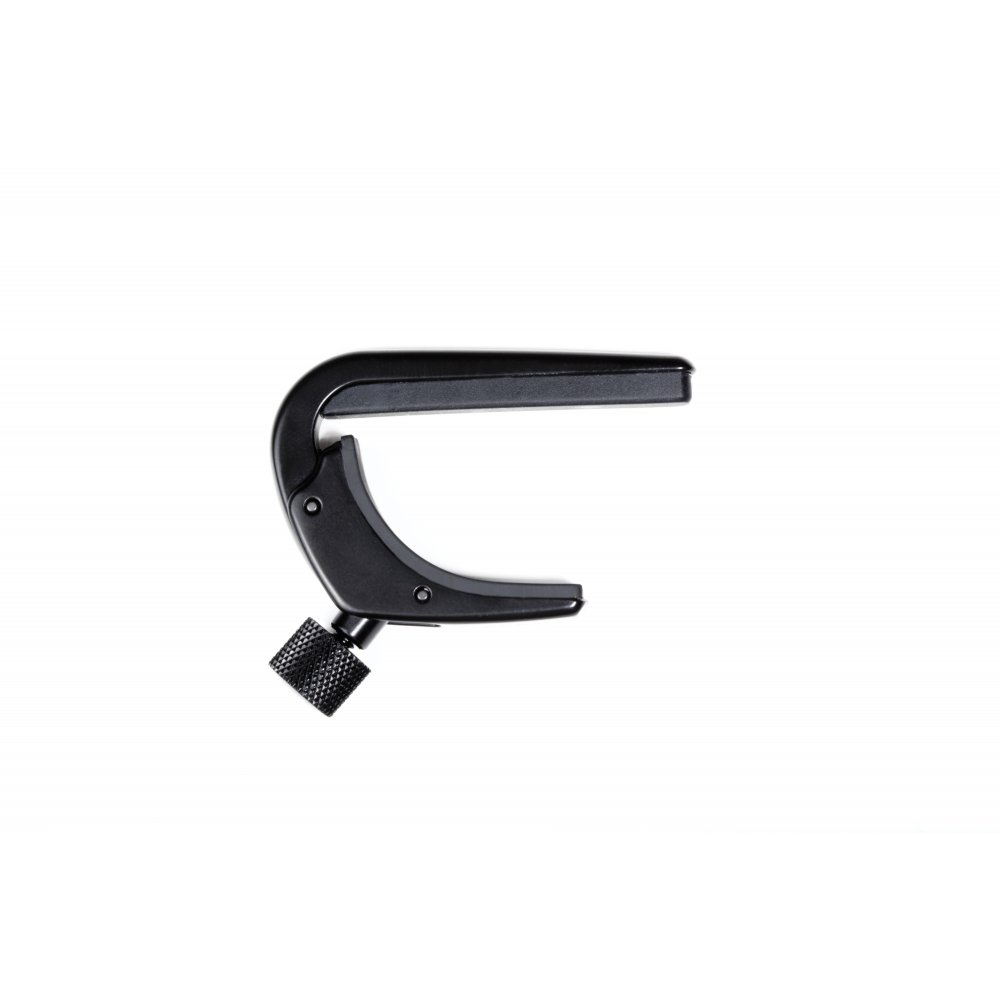We use cookies to make your experience better. To comply with the new e-Privacy directive, we need to ask for your consent to set the cookies. Learn more
Ukulele Capos - What to buy and why..
Ukulele Capo's
Good day to you, have you ever used a Ukulele Capo?
I have it on good authority that the 14th most searched online Ukulele related term in the UK is for a 'Ukulele Capo'. With good reason too. For those of you that have never used a capo and are at all unsure what one is let me give you a brief description. A standard capo is a device that clamps down a whole barre on the neck of an instrument. Why would you do this? Well, if you found a song a bit high or low for you to sing then you may like to transpose the whole song in to a different key. For example; I like to sing a lot of songs on guitar in the key of D and most simple Ukulele renditions of the song are in G or C. If I were to put a capo on my Ukulele on the 2nd fret of the neck – I would be able to play my chords from the key of C along with guitarists in D without having to learn new chord shapes to the song. This is both delightfully lazy and an excellent way to experiment with how you play.
(The first prototype Shubb Capo from the mid 1970's)
 I play in a folk/roots band called Fearne and have done for nearly half of my life. To say I am a little bit set in my ways is probably an understatement and the way in which I click with our Guitarist is enhanced by our joint use of Capo’s. He likes to play many songs in the key of E as the key is comfortable for his voice (he is also very predictable) and it is just not fun or easy to play for four or five minutes on a Ukulele in this key without altering the tuning or getting cramp from all of the barre chords. By placing a capo on the 4th fret of my Ukulele I have managed to create my own style and short runs and this has made playing along on my Ukulele all the more enjoyable. It makes me look like I know what I’m doing when actually what I am doing is much easier than if I were to play without. It also enables me to use more open chords which thickens up everything I play a lot more than if I were to strum a fingered barre chord on the fourth fret.
I play in a folk/roots band called Fearne and have done for nearly half of my life. To say I am a little bit set in my ways is probably an understatement and the way in which I click with our Guitarist is enhanced by our joint use of Capo’s. He likes to play many songs in the key of E as the key is comfortable for his voice (he is also very predictable) and it is just not fun or easy to play for four or five minutes on a Ukulele in this key without altering the tuning or getting cramp from all of the barre chords. By placing a capo on the 4th fret of my Ukulele I have managed to create my own style and short runs and this has made playing along on my Ukulele all the more enjoyable. It makes me look like I know what I’m doing when actually what I am doing is much easier than if I were to play without. It also enables me to use more open chords which thickens up everything I play a lot more than if I were to strum a fingered barre chord on the fourth fret.
 You can use a Capo on any sized instrument but beware that a lot of Soprano Ukes have a neck that is too thin for a capo to do its job properly. We sell a variety of Capos at the Southern Ukulele Store. I urge you to check them out.
TGI Spring Loaded Trigger Capo
This Capo is the cheapest one we currently sell and it does work but isn’t without its flaws. It will work on Tenors and Baritone Ukuleles very well as the increased neck thickness means that the spring in the capo isn’t forced to work as hard. On some smaller Ukuleles it isn’t able to apply enough pressure and certain strings choke when played open.
The best thing about this Capo is that it is small enough and discreet enough to stay largely out of the way. Most capos can be a little cumbersome and obstructive without meaning to be.
The worst thing about this capo is that the spring is exposed and when you test the parameters of the Capos stretch, the spring can pop out. I wouldn’t mind this Capo at home but I wouldn’t want to have to rely on it.
You can use a Capo on any sized instrument but beware that a lot of Soprano Ukes have a neck that is too thin for a capo to do its job properly. We sell a variety of Capos at the Southern Ukulele Store. I urge you to check them out.
TGI Spring Loaded Trigger Capo
This Capo is the cheapest one we currently sell and it does work but isn’t without its flaws. It will work on Tenors and Baritone Ukuleles very well as the increased neck thickness means that the spring in the capo isn’t forced to work as hard. On some smaller Ukuleles it isn’t able to apply enough pressure and certain strings choke when played open.
The best thing about this Capo is that it is small enough and discreet enough to stay largely out of the way. Most capos can be a little cumbersome and obstructive without meaning to be.
The worst thing about this capo is that the spring is exposed and when you test the parameters of the Capos stretch, the spring can pop out. I wouldn’t mind this Capo at home but I wouldn’t want to have to rely on it.
 Kinsman Spring Loaded Trigger Capo
This Capo is only slightly more expensive than the TGI but is definitely an improved Capo. This will work on most Ukuleles regardless of size and doesn’t have an exposed spring which makes it instantly more reliable. The width of the Capo across the neck is a healthy sized 4.5cm so with the exception of some wider necked instruments, it is compatible with nearly everything.
The best thing about this Capo is the price. It does everything any of the other Capos do for half the price.
The worst things about this Capo are the size and weight. It has a tendency to limit your movement either side of it – If you have the capo over the top of the neck it will get in the way a bit less but doesn’t fret the instrument as well as if you fix it to the underside of the neck. It is a great capo if you want to try one but it is the biggest one on our list and that can cause issues for some.
Kinsman Spring Loaded Trigger Capo
This Capo is only slightly more expensive than the TGI but is definitely an improved Capo. This will work on most Ukuleles regardless of size and doesn’t have an exposed spring which makes it instantly more reliable. The width of the Capo across the neck is a healthy sized 4.5cm so with the exception of some wider necked instruments, it is compatible with nearly everything.
The best thing about this Capo is the price. It does everything any of the other Capos do for half the price.
The worst things about this Capo are the size and weight. It has a tendency to limit your movement either side of it – If you have the capo over the top of the neck it will get in the way a bit less but doesn’t fret the instrument as well as if you fix it to the underside of the neck. It is a great capo if you want to try one but it is the biggest one on our list and that can cause issues for some.
 Shubb C9 Ukulele Capo (Lite series and standard brass)
Shubb are the industry standard Capo producer should such a thing exist. It is fair to say that Shubb along with Kyser and perhaps Dunlop have been a fixture in most stringed instrument music shops across the world since the 1970’s. The design works in a clamping motion and the Capo will work with some small adjustments on pretty much any Ukulele in our shop.
The difference between the standard Shubb and the Lite version is the weight. The Lite version is advertised as being half the weight of the original which is nearly true. There is about a 20 gram difference which is going to be important for some but won’t trouble others.
I think the best thing about this Capo is the look. It looks like something everybody from Bob Dylan to James Hill would use. The Ukulele Shubb has rubber parts than can be replaced which means it should never truly need to be replaced. You will probably lose it before it does.
The worst thing about this capo is the width. It struggles to do some Baritones and is really at its best with the middle sizes (Concert/Tenor).
Shubb C9 Ukulele Capo (Lite series and standard brass)
Shubb are the industry standard Capo producer should such a thing exist. It is fair to say that Shubb along with Kyser and perhaps Dunlop have been a fixture in most stringed instrument music shops across the world since the 1970’s. The design works in a clamping motion and the Capo will work with some small adjustments on pretty much any Ukulele in our shop.
The difference between the standard Shubb and the Lite version is the weight. The Lite version is advertised as being half the weight of the original which is nearly true. There is about a 20 gram difference which is going to be important for some but won’t trouble others.
I think the best thing about this Capo is the look. It looks like something everybody from Bob Dylan to James Hill would use. The Ukulele Shubb has rubber parts than can be replaced which means it should never truly need to be replaced. You will probably lose it before it does.
The worst thing about this capo is the width. It struggles to do some Baritones and is really at its best with the middle sizes (Concert/Tenor).
 D’Addario NS Ukulele Pro Capo
D’Addario are becoming quite the instrument accessory innovators. Whether it’s a capo, polishing cloth, lemon oil, strap or strings; D’Addario are producing unique and well researched alternatives to the industry kings. D’addario produce a lightweight Capo made of airline grade aluminum. It is the smallest capo on the list and the strongest. Many big Ukulele names use this capo and the Guitar version is just as popular.
The best thing about this capo has to be its design. It is a sleek black gloss finish and weighs nothing. With a bit of adjustment it will fit on any Ukulele of standard size we have in store and it is not the most expensive Capo on the market.
The worst thing about this Capo is that is small and discreet enough that it is slightly easier to lose than other Capos.
D’Addario NS Ukulele Pro Capo
D’Addario are becoming quite the instrument accessory innovators. Whether it’s a capo, polishing cloth, lemon oil, strap or strings; D’Addario are producing unique and well researched alternatives to the industry kings. D’addario produce a lightweight Capo made of airline grade aluminum. It is the smallest capo on the list and the strongest. Many big Ukulele names use this capo and the Guitar version is just as popular.
The best thing about this capo has to be its design. It is a sleek black gloss finish and weighs nothing. With a bit of adjustment it will fit on any Ukulele of standard size we have in store and it is not the most expensive Capo on the market.
The worst thing about this Capo is that is small and discreet enough that it is slightly easier to lose than other Capos.
 It was a bit short and sweet today but hopefully it will help you make a decision on which one to buy and why you would buy it?
Until next time
Alex Beds
It was a bit short and sweet today but hopefully it will help you make a decision on which one to buy and why you would buy it?
Until next time
Alex Beds
 I play in a folk/roots band called Fearne and have done for nearly half of my life. To say I am a little bit set in my ways is probably an understatement and the way in which I click with our Guitarist is enhanced by our joint use of Capo’s. He likes to play many songs in the key of E as the key is comfortable for his voice (he is also very predictable) and it is just not fun or easy to play for four or five minutes on a Ukulele in this key without altering the tuning or getting cramp from all of the barre chords. By placing a capo on the 4th fret of my Ukulele I have managed to create my own style and short runs and this has made playing along on my Ukulele all the more enjoyable. It makes me look like I know what I’m doing when actually what I am doing is much easier than if I were to play without. It also enables me to use more open chords which thickens up everything I play a lot more than if I were to strum a fingered barre chord on the fourth fret.
I play in a folk/roots band called Fearne and have done for nearly half of my life. To say I am a little bit set in my ways is probably an understatement and the way in which I click with our Guitarist is enhanced by our joint use of Capo’s. He likes to play many songs in the key of E as the key is comfortable for his voice (he is also very predictable) and it is just not fun or easy to play for four or five minutes on a Ukulele in this key without altering the tuning or getting cramp from all of the barre chords. By placing a capo on the 4th fret of my Ukulele I have managed to create my own style and short runs and this has made playing along on my Ukulele all the more enjoyable. It makes me look like I know what I’m doing when actually what I am doing is much easier than if I were to play without. It also enables me to use more open chords which thickens up everything I play a lot more than if I were to strum a fingered barre chord on the fourth fret.
 You can use a Capo on any sized instrument but beware that a lot of Soprano Ukes have a neck that is too thin for a capo to do its job properly. We sell a variety of Capos at the Southern Ukulele Store. I urge you to check them out.
TGI Spring Loaded Trigger Capo
This Capo is the cheapest one we currently sell and it does work but isn’t without its flaws. It will work on Tenors and Baritone Ukuleles very well as the increased neck thickness means that the spring in the capo isn’t forced to work as hard. On some smaller Ukuleles it isn’t able to apply enough pressure and certain strings choke when played open.
The best thing about this Capo is that it is small enough and discreet enough to stay largely out of the way. Most capos can be a little cumbersome and obstructive without meaning to be.
The worst thing about this capo is that the spring is exposed and when you test the parameters of the Capos stretch, the spring can pop out. I wouldn’t mind this Capo at home but I wouldn’t want to have to rely on it.
You can use a Capo on any sized instrument but beware that a lot of Soprano Ukes have a neck that is too thin for a capo to do its job properly. We sell a variety of Capos at the Southern Ukulele Store. I urge you to check them out.
TGI Spring Loaded Trigger Capo
This Capo is the cheapest one we currently sell and it does work but isn’t without its flaws. It will work on Tenors and Baritone Ukuleles very well as the increased neck thickness means that the spring in the capo isn’t forced to work as hard. On some smaller Ukuleles it isn’t able to apply enough pressure and certain strings choke when played open.
The best thing about this Capo is that it is small enough and discreet enough to stay largely out of the way. Most capos can be a little cumbersome and obstructive without meaning to be.
The worst thing about this capo is that the spring is exposed and when you test the parameters of the Capos stretch, the spring can pop out. I wouldn’t mind this Capo at home but I wouldn’t want to have to rely on it.
 Kinsman Spring Loaded Trigger Capo
This Capo is only slightly more expensive than the TGI but is definitely an improved Capo. This will work on most Ukuleles regardless of size and doesn’t have an exposed spring which makes it instantly more reliable. The width of the Capo across the neck is a healthy sized 4.5cm so with the exception of some wider necked instruments, it is compatible with nearly everything.
The best thing about this Capo is the price. It does everything any of the other Capos do for half the price.
The worst things about this Capo are the size and weight. It has a tendency to limit your movement either side of it – If you have the capo over the top of the neck it will get in the way a bit less but doesn’t fret the instrument as well as if you fix it to the underside of the neck. It is a great capo if you want to try one but it is the biggest one on our list and that can cause issues for some.
Kinsman Spring Loaded Trigger Capo
This Capo is only slightly more expensive than the TGI but is definitely an improved Capo. This will work on most Ukuleles regardless of size and doesn’t have an exposed spring which makes it instantly more reliable. The width of the Capo across the neck is a healthy sized 4.5cm so with the exception of some wider necked instruments, it is compatible with nearly everything.
The best thing about this Capo is the price. It does everything any of the other Capos do for half the price.
The worst things about this Capo are the size and weight. It has a tendency to limit your movement either side of it – If you have the capo over the top of the neck it will get in the way a bit less but doesn’t fret the instrument as well as if you fix it to the underside of the neck. It is a great capo if you want to try one but it is the biggest one on our list and that can cause issues for some.
 Shubb C9 Ukulele Capo (Lite series and standard brass)
Shubb are the industry standard Capo producer should such a thing exist. It is fair to say that Shubb along with Kyser and perhaps Dunlop have been a fixture in most stringed instrument music shops across the world since the 1970’s. The design works in a clamping motion and the Capo will work with some small adjustments on pretty much any Ukulele in our shop.
The difference between the standard Shubb and the Lite version is the weight. The Lite version is advertised as being half the weight of the original which is nearly true. There is about a 20 gram difference which is going to be important for some but won’t trouble others.
I think the best thing about this Capo is the look. It looks like something everybody from Bob Dylan to James Hill would use. The Ukulele Shubb has rubber parts than can be replaced which means it should never truly need to be replaced. You will probably lose it before it does.
The worst thing about this capo is the width. It struggles to do some Baritones and is really at its best with the middle sizes (Concert/Tenor).
Shubb C9 Ukulele Capo (Lite series and standard brass)
Shubb are the industry standard Capo producer should such a thing exist. It is fair to say that Shubb along with Kyser and perhaps Dunlop have been a fixture in most stringed instrument music shops across the world since the 1970’s. The design works in a clamping motion and the Capo will work with some small adjustments on pretty much any Ukulele in our shop.
The difference between the standard Shubb and the Lite version is the weight. The Lite version is advertised as being half the weight of the original which is nearly true. There is about a 20 gram difference which is going to be important for some but won’t trouble others.
I think the best thing about this Capo is the look. It looks like something everybody from Bob Dylan to James Hill would use. The Ukulele Shubb has rubber parts than can be replaced which means it should never truly need to be replaced. You will probably lose it before it does.
The worst thing about this capo is the width. It struggles to do some Baritones and is really at its best with the middle sizes (Concert/Tenor).
 D’Addario NS Ukulele Pro Capo
D’Addario are becoming quite the instrument accessory innovators. Whether it’s a capo, polishing cloth, lemon oil, strap or strings; D’Addario are producing unique and well researched alternatives to the industry kings. D’addario produce a lightweight Capo made of airline grade aluminum. It is the smallest capo on the list and the strongest. Many big Ukulele names use this capo and the Guitar version is just as popular.
The best thing about this capo has to be its design. It is a sleek black gloss finish and weighs nothing. With a bit of adjustment it will fit on any Ukulele of standard size we have in store and it is not the most expensive Capo on the market.
The worst thing about this Capo is that is small and discreet enough that it is slightly easier to lose than other Capos.
D’Addario NS Ukulele Pro Capo
D’Addario are becoming quite the instrument accessory innovators. Whether it’s a capo, polishing cloth, lemon oil, strap or strings; D’Addario are producing unique and well researched alternatives to the industry kings. D’addario produce a lightweight Capo made of airline grade aluminum. It is the smallest capo on the list and the strongest. Many big Ukulele names use this capo and the Guitar version is just as popular.
The best thing about this capo has to be its design. It is a sleek black gloss finish and weighs nothing. With a bit of adjustment it will fit on any Ukulele of standard size we have in store and it is not the most expensive Capo on the market.
The worst thing about this Capo is that is small and discreet enough that it is slightly easier to lose than other Capos.
 It was a bit short and sweet today but hopefully it will help you make a decision on which one to buy and why you would buy it?
Until next time
Alex Beds
It was a bit short and sweet today but hopefully it will help you make a decision on which one to buy and why you would buy it?
Until next time
Alex BedsCustomer reviews
-
Trustpilot Reviews - Trustpilot Southern Ukulele Store Reviews




